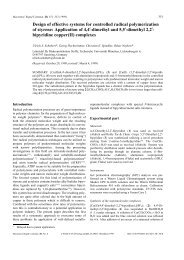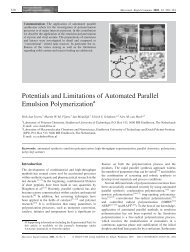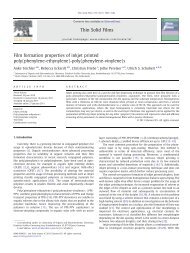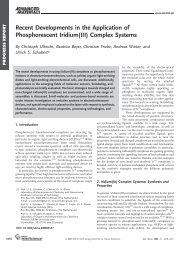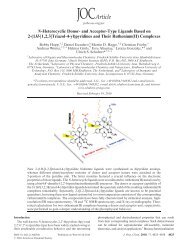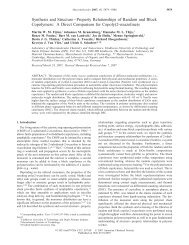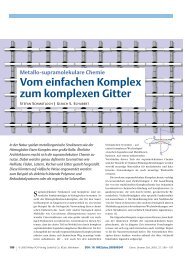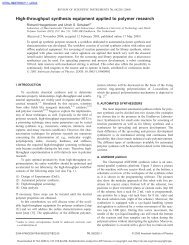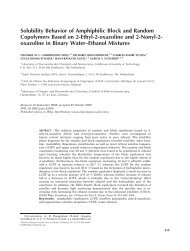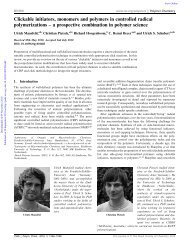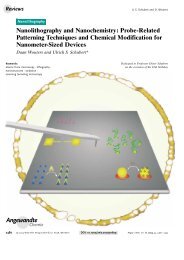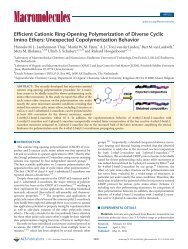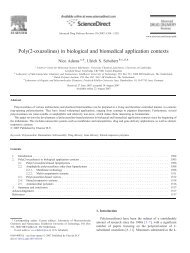Microwave-Assisted Polymer Synthesis: Recent Developments in a ...
Microwave-Assisted Polymer Synthesis: Recent Developments in a ...
Microwave-Assisted Polymer Synthesis: Recent Developments in a ...
You also want an ePaper? Increase the reach of your titles
YUMPU automatically turns print PDFs into web optimized ePapers that Google loves.
R. Hoogenboom, U. S. Schubert<br />
the more homogeneous heat<strong>in</strong>g under microwave irradiation<br />
that becomes more apparent at high conversions due<br />
to the <strong>in</strong>creased viscosity of the polymerization mixture. In<br />
contrast, Zhu et al. observed a clear acceleration of the NMP<br />
of styrene <strong>in</strong> bulk under microwave irradiation (monomode<br />
microwave reactor). [116] The rate of polymerization<br />
<strong>in</strong>creased with <strong>in</strong>creas<strong>in</strong>g microwave power while the<br />
control over the polymerization was ma<strong>in</strong>ta<strong>in</strong>ed. The<br />
microwave-assisted RAFT polymerization of both styrene<br />
and methyl methacrylate was <strong>in</strong>vestigated by Perrier and<br />
coworkers. [117] For both monomers an <strong>in</strong>crease <strong>in</strong> polymerization<br />
rate was observed when microwave irradiation<br />
was applied as heat source. Moreover, l<strong>in</strong>ear first-order<br />
k<strong>in</strong>etics were observed and a l<strong>in</strong>ear <strong>in</strong>crease <strong>in</strong> molecular<br />
weight with conversion demonstrat<strong>in</strong>g a good control over<br />
the polymerizations under microwave irradiation was also<br />
observed. Zhu et al. reported similar observations for the<br />
RAFT polymerization of styrene us<strong>in</strong>g a domestic microwave<br />
oven. [118]<br />
microwave irradiation that were observed <strong>in</strong> recent years.<br />
In addition, several open questions such as specific microwave<br />
absorption <strong>in</strong> copolymerizations as well as upscal<strong>in</strong>g<br />
issues have to be addressed <strong>in</strong> the com<strong>in</strong>g years.<br />
Nevertheless, it is expected that the use of microwave<br />
irradiation will evolve from a research topic <strong>in</strong>to a common<br />
research tool <strong>in</strong> polymer science. Whether microwave-assisted<br />
polymerization procedures will be <strong>in</strong>corporated<br />
<strong>in</strong>to future commercial processes is still uncerta<strong>in</strong><br />
and would only be feasible for processes that show a clear<br />
(economical) advantage over thermal heat<strong>in</strong>g.<br />
Acknowledgements: This study was supported by the Dutch<br />
<strong>Polymer</strong> Institute (DPI) and the Fonds der Chemischen Industrie.<br />
Received: October 30, 2006; Accepted: December 8, 2006; DOI:<br />
10.1002/marc.200600749<br />
Keywords: microwave irradiation; polymer; radical polymerization;<br />
r<strong>in</strong>g-open<strong>in</strong>g polymerization; step-growth polymerization<br />
Summary and Outlook<br />
The use of microwave irradiation <strong>in</strong> polymer chemistry is a<br />
rapidly expand<strong>in</strong>g field of research. In the last two years,<br />
the number of publications per year has doubled. The ma<strong>in</strong><br />
reason for this <strong>in</strong>creased <strong>in</strong>terest <strong>in</strong> the use of microwave<br />
irradiation is the often observed acceleration of polymerizations<br />
when performed with microwave irradiation.<br />
Nevertheless, <strong>in</strong> many cases the acceleration is due to<br />
<strong>in</strong>creased polymerization temperatures compared to thermal<br />
heat<strong>in</strong>g, whereby it should be noted that these<br />
<strong>in</strong>creased temperatures are much easier accessible when<br />
us<strong>in</strong>g microwave irradiation. In addition to the <strong>in</strong>creased<br />
temperatures, many of the observed advantages of microwave<br />
heat<strong>in</strong>g can be ascribed to the fast and homogeneous<br />
heat<strong>in</strong>g that can prevent thermal decomposition and/or<br />
other side reactions caused by local overheat<strong>in</strong>g over the<br />
polymerization mixtures with thermal heat<strong>in</strong>g. Besides<br />
these improvements that can be ascribed to thermal<br />
effects under microwave irradiation, several examples<br />
have been reported <strong>in</strong> which non-thermal microwave<br />
effects were observed. These non-thermal microwave<br />
effects can be rationalized by specific microwave absorption<br />
of polar <strong>in</strong>termediates and or reagents mak<strong>in</strong>g them<br />
more reactive. However, the observation of such effects<br />
seems to depend on the choice of microwave reactors<br />
(domestic, monomode, or multimode microwaves) as well<br />
as the choice of polymerization conditions. In addition,<br />
attempts to change monomer reactivity and reactivity<br />
ratios <strong>in</strong> copolymerizations of monomers with different<br />
polarities have not succeeded so far.<br />
The field of microwave-assisted polymerizations is<br />
believed to cont<strong>in</strong>ue its rapid expansion <strong>in</strong> the com<strong>in</strong>g<br />
years <strong>in</strong>spired by the large number of beneficial effects of<br />
[1] B. L. Hayes, ‘‘<strong>Microwave</strong> <strong>Synthesis</strong>: Chemistry at the Speed of<br />
Light’’, CEM Publish<strong>in</strong>g, Matthews 2002.<br />
[2] C. O. Kappe, Angew. Chem. Int. Ed. 2004, 43, 6250.<br />
[3] J. P. Tierney, P. Lidstrom, ‘‘<strong>Microwave</strong> <strong>Assisted</strong> Organic<br />
Chemistry’’, Taylor & Francis Group, Ab<strong>in</strong>gdon 2004.<br />
[4] C. O. Kappe, A. Stadler, ‘‘<strong>Microwave</strong>s <strong>in</strong> Organic and Medic<strong>in</strong>al<br />
Chemistry’’, Wiley VCH, We<strong>in</strong>heim 2005.<br />
[5] C. Gabriel, S. Gabriel, E. H. Grant, B. S. J. Halstead,<br />
D. M. P. M<strong>in</strong>gos, Chem. Soc. Rev. 1998, 27, 213.<br />
[6] A. d. l. Hoz, A. Diaz-Ortiz, A. Moreno, Chem. Soc. Rev. 2005,34,<br />
164.<br />
[7] F. Wiesbrock, R. Hoogenboom, U. S. Schubert, Macromol.<br />
Rapid Commun. 2004, 25, 1739.<br />
[8] Results of a search for ‘‘<strong>Microwave</strong> and <strong>Polymer</strong>ization’’ <strong>in</strong><br />
the SciF<strong>in</strong>der database on October 23, 2006.<br />
[9] J. Pielichowski, E. Dziki, J. Polaczek, Polym. J. Chem. Technol.<br />
2003, 5, 3.<br />
[10] K. Faghihi, M. Hagibeygi, Eur. Polym. J. 2003, 39, 2307.<br />
[11] A. A. Caouthar, A. Loupy, M. Bortolussi, J.-C. Blais,<br />
L. Dubreucq, A. Meddour, J. Polym. Sci., Part A: Polym. Chem.<br />
2005, 43, 6480.<br />
[12] N. Li, J. Lu, S. Yao, Macromol. Chem. Phys. 2005, 206, 559.<br />
[13] H. Yeganeh, B. Tamami, I. Ghazi, Eur. Polym. J. 2004,40, 2059.<br />
[14] K. Faghihi, Ch<strong>in</strong>. J. Polym. Sci. 2004, 22, 343.<br />
[15] K. Faghihi, K. Zamani, A. Mirsamie, S. Mallakpour, Polym. Int.<br />
2004, 53, 1226.<br />
[16] K. Faghihi, A. Mirsamie, Ch<strong>in</strong>. J. Polym. Sci. 2005, 23, 63.<br />
[17] K. Faghihi, M. Hajibeygi, J. Appl. Polym. Sci. 2004, 92, 3447.<br />
[18] S. Mallakpour, E. Kowsari, J. Appl. Polym. Sci. 2005, 96, 435.<br />
[19] S. Mallakpour, E. Kowsari, Polym. Eng. Sci. 2006, 46, 558.<br />
[20] S. Mallakpour, E. Kowsari, Iran. Polym. J. 2005, 14, 799.<br />
[21] S. Mallakpour, M. H. Shahmohammadi, Iran. Polym. J. 2005,<br />
14, 473.<br />
[22] S. Mallakpour, E. Kowsari, Polym. Adv. Technol. 2005, 16,<br />
466.<br />
[23] S. Mallakpour, E. Kowsari, Iran. Polym. J. 2006, 15, 239.<br />
384<br />
Macromol. Rapid Commun. 2007, 28, 368–386<br />
ß 2007 WILEY-VCH Verlag GmbH & Co. KGaA, We<strong>in</strong>heim<br />
DOI: 10.1002/marc.200600749



